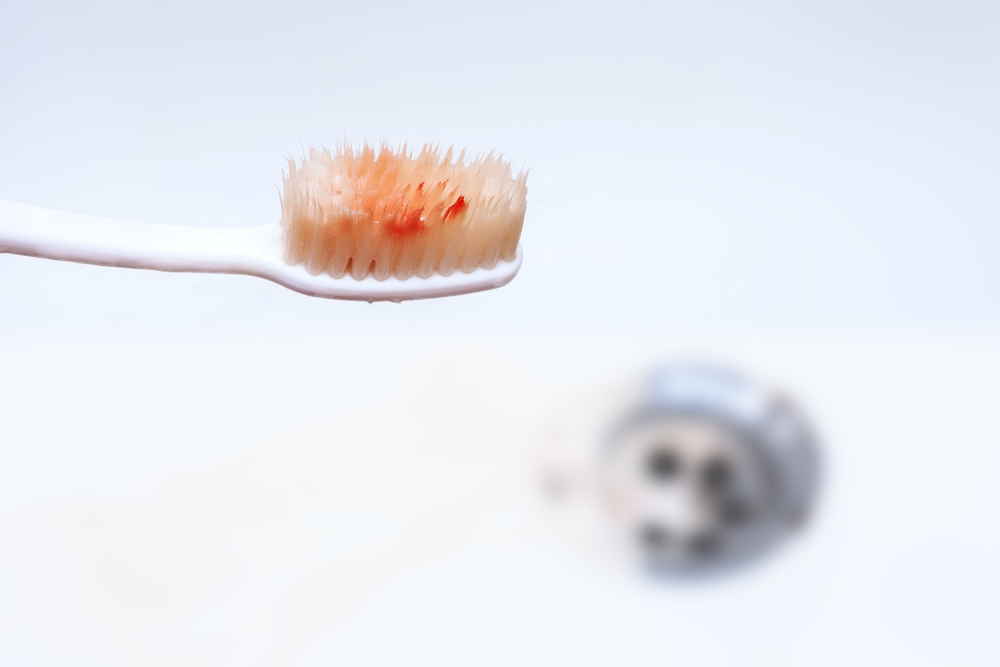[et_pb_section admin_label=”section”][et_pb_row admin_label=”row”][et_pb_column type=”4_4″][et_pb_text admin_label=”Text” background_layout=”light” text_orientation=”left” use_border_color=”off” border_color=”#ffffff” border_style=”solid”]
Believe it or not, gum disease in children is not all that rare but being on the lookout for the signs of it can help keep your child’s mouth and overall health in check.
 CHRONIC GINGIVITIS – is fairly common in children. It typically causes the gum tissue to turn red, become swollen and bleed very easily. It is completely preventable and correctable with regular brushing, flossing and appropriate dental care. If it goes untreated, it can and very likely will, progress to more serious types of gum disease.
AGGRESSIVE PERIODONTITIS – can impact younger people who are overall in good health. Localized aggressive periodontitis can occur in teens and young adults and typically involves the incisors and first molars. It can cause severe loss of the bone that supports the teeth), and surprisingly, there will be very little plaque or calculus.
GENERALIZED AGGRESSIVE PERIODONTITIS – may start around puberty and encompass the entire mouth. It causes inflammation or swollen gums and substantial buildups of plaque and calculus. If not treated, it can even lead to the teeth becoming loose.
CHRONIC GINGIVITIS – is fairly common in children. It typically causes the gum tissue to turn red, become swollen and bleed very easily. It is completely preventable and correctable with regular brushing, flossing and appropriate dental care. If it goes untreated, it can and very likely will, progress to more serious types of gum disease.
AGGRESSIVE PERIODONTITIS – can impact younger people who are overall in good health. Localized aggressive periodontitis can occur in teens and young adults and typically involves the incisors and first molars. It can cause severe loss of the bone that supports the teeth), and surprisingly, there will be very little plaque or calculus.
GENERALIZED AGGRESSIVE PERIODONTITIS – may start around puberty and encompass the entire mouth. It causes inflammation or swollen gums and substantial buildups of plaque and calculus. If not treated, it can even lead to the teeth becoming loose.
 Good oral hygiene is crucial during adolescence. The hormonal changes related to puberty can put teens at greater risk for getting gum disease. An increased level of hormones, like progesterone or estrogen can cause increased blood circulation to the gums. This can add to the gum’s sensitivity and may cause a bigger reaction to any irritation, like particles of food or plaque. If this happens, the gums may turn red and become swollen and sore.
The further along your teen is through puberty, the lower the susceptibility for swelling of the gums. However, it is still very important to brush and floss twice daily along with regular dental visits. In some cases, your general dentist may recommend periodontal therapy to avoid tissue and bone damage around the teeth.
The key to effective treatment of gum disease is early diagnosis, so it’s important that your children get thorough periodontal exams as a part of their regular dental check-ups.
Another consideration: if your child has an advanced form of gum disease, it may also be an early sign of a systemic disease. Many systemic diseases have been linked to gum disease so staying on top of their oral health can also go a long way toward keeping their overall health in check. If their advancing gum disease seems to be resistant to treatment, a general health check-up would be recommended.
Good oral hygiene is crucial during adolescence. The hormonal changes related to puberty can put teens at greater risk for getting gum disease. An increased level of hormones, like progesterone or estrogen can cause increased blood circulation to the gums. This can add to the gum’s sensitivity and may cause a bigger reaction to any irritation, like particles of food or plaque. If this happens, the gums may turn red and become swollen and sore.
The further along your teen is through puberty, the lower the susceptibility for swelling of the gums. However, it is still very important to brush and floss twice daily along with regular dental visits. In some cases, your general dentist may recommend periodontal therapy to avoid tissue and bone damage around the teeth.
The key to effective treatment of gum disease is early diagnosis, so it’s important that your children get thorough periodontal exams as a part of their regular dental check-ups.
Another consideration: if your child has an advanced form of gum disease, it may also be an early sign of a systemic disease. Many systemic diseases have been linked to gum disease so staying on top of their oral health can also go a long way toward keeping their overall health in check. If their advancing gum disease seems to be resistant to treatment, a general health check-up would be recommended.
There are three types of gum disease found in children:
 CHRONIC GINGIVITIS – is fairly common in children. It typically causes the gum tissue to turn red, become swollen and bleed very easily. It is completely preventable and correctable with regular brushing, flossing and appropriate dental care. If it goes untreated, it can and very likely will, progress to more serious types of gum disease.
AGGRESSIVE PERIODONTITIS – can impact younger people who are overall in good health. Localized aggressive periodontitis can occur in teens and young adults and typically involves the incisors and first molars. It can cause severe loss of the bone that supports the teeth), and surprisingly, there will be very little plaque or calculus.
GENERALIZED AGGRESSIVE PERIODONTITIS – may start around puberty and encompass the entire mouth. It causes inflammation or swollen gums and substantial buildups of plaque and calculus. If not treated, it can even lead to the teeth becoming loose.
CHRONIC GINGIVITIS – is fairly common in children. It typically causes the gum tissue to turn red, become swollen and bleed very easily. It is completely preventable and correctable with regular brushing, flossing and appropriate dental care. If it goes untreated, it can and very likely will, progress to more serious types of gum disease.
AGGRESSIVE PERIODONTITIS – can impact younger people who are overall in good health. Localized aggressive periodontitis can occur in teens and young adults and typically involves the incisors and first molars. It can cause severe loss of the bone that supports the teeth), and surprisingly, there will be very little plaque or calculus.
GENERALIZED AGGRESSIVE PERIODONTITIS – may start around puberty and encompass the entire mouth. It causes inflammation or swollen gums and substantial buildups of plaque and calculus. If not treated, it can even lead to the teeth becoming loose.
WHAT ARE THE SYMPTOMS OF GUM DISEASE IN CHILDREN?
There are four basic signs of gum disease to watch for in children or even adults: • Bleeding Gums – gums bleed while brushing teeth, flossing or any other time • Puffiness – gums are bright red, swollen and tender or sore • Recession – gums have receded away from teeth and may even expose the roots • Bad Breath – Constant bad breath that doesn’t go away even with regular brushing and flossing Good oral hygiene is crucial during adolescence. The hormonal changes related to puberty can put teens at greater risk for getting gum disease. An increased level of hormones, like progesterone or estrogen can cause increased blood circulation to the gums. This can add to the gum’s sensitivity and may cause a bigger reaction to any irritation, like particles of food or plaque. If this happens, the gums may turn red and become swollen and sore.
The further along your teen is through puberty, the lower the susceptibility for swelling of the gums. However, it is still very important to brush and floss twice daily along with regular dental visits. In some cases, your general dentist may recommend periodontal therapy to avoid tissue and bone damage around the teeth.
The key to effective treatment of gum disease is early diagnosis, so it’s important that your children get thorough periodontal exams as a part of their regular dental check-ups.
Another consideration: if your child has an advanced form of gum disease, it may also be an early sign of a systemic disease. Many systemic diseases have been linked to gum disease so staying on top of their oral health can also go a long way toward keeping their overall health in check. If their advancing gum disease seems to be resistant to treatment, a general health check-up would be recommended.
Good oral hygiene is crucial during adolescence. The hormonal changes related to puberty can put teens at greater risk for getting gum disease. An increased level of hormones, like progesterone or estrogen can cause increased blood circulation to the gums. This can add to the gum’s sensitivity and may cause a bigger reaction to any irritation, like particles of food or plaque. If this happens, the gums may turn red and become swollen and sore.
The further along your teen is through puberty, the lower the susceptibility for swelling of the gums. However, it is still very important to brush and floss twice daily along with regular dental visits. In some cases, your general dentist may recommend periodontal therapy to avoid tissue and bone damage around the teeth.
The key to effective treatment of gum disease is early diagnosis, so it’s important that your children get thorough periodontal exams as a part of their regular dental check-ups.
Another consideration: if your child has an advanced form of gum disease, it may also be an early sign of a systemic disease. Many systemic diseases have been linked to gum disease so staying on top of their oral health can also go a long way toward keeping their overall health in check. If their advancing gum disease seems to be resistant to treatment, a general health check-up would be recommended.
